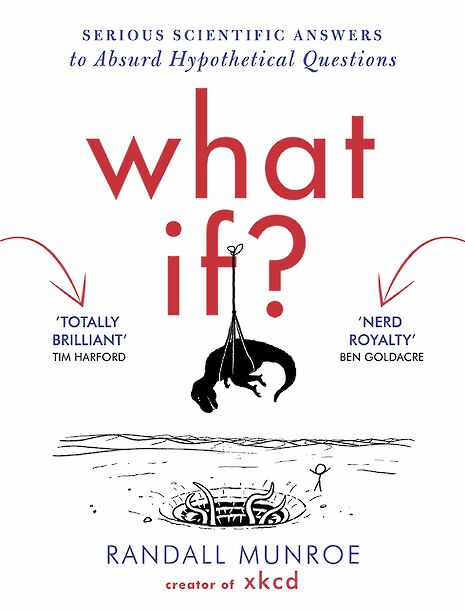Book: What if?
Sam Hewitt reviews the latest book from Randall Munroe, creator of xkcd.com

Have you ever had one of those questions flit flirtatiously through your mind? The sort of absurd question to which one of your more annoying mathmo friends would probably offer a flippant answer in a patronising tone. The sort of question that forms the subject of a long, poorly informed internet argument, which quickly descends into discussions of perpetual motion machines and people’s mothers, but that itself has a certain hysterical allure. Questions like: 'What would happen if everyone on earth jumped in the same place at the same time?', 'What would happen if you fired a bullet with the density of a neutron star?', and the classic, 'What would happen if you had a mole (unit) of moles (little furry animal)?' These are questions to which you never seem to find satisfactory answers, yet they niggle at your curiosity, begging to be answered. Luckily, someone is doing just that.
Randall Munroe is the author of the xkcd webcomic and an ex-NASA roboticist. His short online comic strips, created in a simple stickman style and injected with plenty of wit, have become incredibly popular, particularly among scientists and mathematicians. A while ago, he added a new section to his website called 'What if?' that offers “serious scientific answers to absurd hypothetical questions” sent in by readers, accompanied by his signature drawings and humour. Due to the popularity of this blog, he collated many of these answers (along with several never released on the internet) into a hardback book, whose cover immediately puts you in the right frame of mind with an image of a Tyrannosaurus rex being lowered into the Sarlacc pit from Star Wars (a question he wisely left to the imagination of the reader). The contents are as amusing, informative, and indulgently fascinating as the answers to these questions should be, and the inclusion of "weird (and worrying) questions" that he never got around to answering is a nice addition – someone even sent in a question about the nutritional value of the human body.
The book is sometimes dangerously absorbing – I hesitate to suggest it would be an excellent loo read, given that it might make others worry about your health. Randall is also well aware of what you want to read; when a question is disappointingly anticlimactic, he simply asks better questions until the moon is thrown out of orbit by lasers. The only gripes I really have about the book are trivial: there are one or two typed formulae which haven’t quite been processed properly, and addiction to the online section (which is continuously updated) is simply inevitable. However, if you have ever been gripped by an insatiable, preposterous intellectual curiosity (regardless of actual scientific knowledge), I could not think of a better book to keep you from doing that essay for an extra hour or two.
 News / Eight Cambridge researchers awarded €17m in ERC research grants27 December 2025
News / Eight Cambridge researchers awarded €17m in ERC research grants27 December 2025 News / News in Brief: carols, card games, and canine calamities28 December 2025
News / News in Brief: carols, card games, and canine calamities28 December 2025 News / Downing investigates ‘mysterious’ underground burial vault 29 December 2025
News / Downing investigates ‘mysterious’ underground burial vault 29 December 2025 Interviews / Meet Juan Michel, Cambridge’s multilingual musician29 December 2025
Interviews / Meet Juan Michel, Cambridge’s multilingual musician29 December 2025 Sport / Hard work, heartbreak and hope: international gymnast Maddie Marshall’s journey 29 December 2025
Sport / Hard work, heartbreak and hope: international gymnast Maddie Marshall’s journey 29 December 2025






